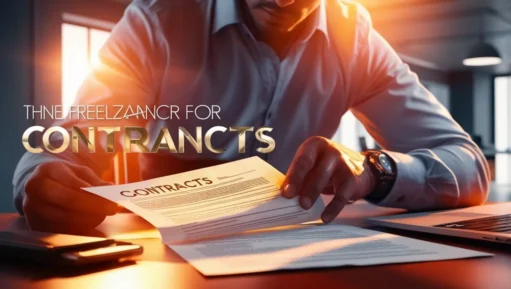Contracts: Your Safety Net in the Freelance World
For freelancers, a well-written contract is much more than paperwork—it’s your shield, roadmap, and negotiation tool, all rolled into one. In an industry characterized by remote work, variable clients, evolving project scopes, and no HR department to call, contracts provide the security and clarity you need to build sustainable, professional relationships and safeguard your livelihood. Many beginners overlook contracts, only to learn the hard way that verbal agreements rarely stand up. This comprehensive guide will demystify contracts, explain why every freelancer needs them, what they should contain, how to use them as a client relationship tool, and how they empower you to say “no” when boundaries are crossed.
Why Freelance Contracts Are Non-Negotiable
1. Protecting Your Rights and Income
A contract is a legally binding agreement between you and your client. It clearly defines expectations, deliverables, payment terms, revisions, intellectual property ownership, deadlines, and what happens if problems arise. Without a contract, you have little recourse if a client ghosts, demands extra unpaid work, or disputes your invoice.
2. Preventing Scope Creep
Scope creep—the gradual, often unintentional expansion of a project’s demands—is a major profit killer. Without explicit terms, you can quickly find yourself working triple the hours for the same pay. Contracts set boundaries, making it clear what is (and isn’t) included, and how additional requests will be handled and billed.
3. Ensuring Professionalism
A contract signals to your client that you take your work (and their project) seriously. It sets a professional tone, discourages casual or exploitative clients, and establishes mutual trust.
4. Providing Peace of Mind
Freelancers sleep better when they know payment dates, revision limits, responsibilities, and project milestones are clear, with recourse if anything goes wrong. A good contract lowers stress for both parties.
Critical Elements Every Freelance Contract Should Include
1. Project Scope:
Describe the work you’ll do in detail—deliverables, format, style, length, platforms, etc.
2. Timeline and Deadlines:
Specify when draft(s), revisions, and the final product are due. Include contingency plans for project delays.
3. Payment Terms:
- Total project fee or hourly rate, plus payment schedule (upfront deposit, milestones, final payment)
- Accepted methods (bank transfer, PayPal, etc.)
- Late payment penalties or interest, if allowed by law
4. Revision Policy:
- How many rounds of revisions are included?
- What constitutes a revision versus a new project?
5. Cancellation Terms:
- What happens if either party cancels mid-project? Is there a non-refundable percentage?
- How is incomplete work compensated?
6. Intellectual Property and Usage Rights:
- Who owns the final work after payment? (Client usually does, but clarify)
- Can you showcase the work in your portfolio?
7. Confidentiality or NDAs:
- If you’ll access sensitive information or proprietary client data.
8. Dispute Resolution:
- Outlines steps for resolving disagreements—mediation, arbitration, or specific legal jurisdiction.
9. Signatures:
Both parties must sign (digital or handwritten) to make the agreement enforceable.
How to Create and Use Contracts
- Templates: Start with freelancer-specific contract templates (from vetted legal sites, unions, or platforms like AND.CO or Bonsai) and customize for each project. For complex situations, consult a legal professional for tailored contracts.
- Plain English: Avoid complicated legal jargon; simplicity improves understanding for everyone.
- Digital Tools: Use electronic signature services like DocuSign, HelloSign, or Adobe Sign for fast, secure approvals.
- Discuss the Contract: Talk through terms with new clients. Adjust mutually, showing flexibility but never waiving your core protections.
- Never Start Work Without a Signed Contract: No matter how urgent, polite, or “friendly” the client seems.
Navigating Pushback: What If a Client Resists?
Some clients may balk at signing contracts, claiming it’s “overkill” or a sign of mistrust. Address these objections by explaining that your contracts:
- Protect both parties, not just you
- Set clear ground rules, minimizing misunderstandings
- Are standard business practice for all professionals
If a client flatly refuses to sign, treat it as a red flag. It’s often a sign of future disputes or disregard for your terms—consider walking away.
Contracts as Relationship Building Tools
Counterintuitively, contracts can improve client relationships, not just “protect” against worst-case scenarios:
- Reduce misunderstandings: Clients feel reassured by clear expectations
- Professionalize negotiations: Decisions are based on written terms, not emotion or memory
- Showcase your process: Including timelines, reporting methods, revision schedules, and check-in points proves you’re organized and trustworthy
Over time, transparent processes set you apart from less-organized freelancers.
Updating and Reviewing Contracts
- Review before every new project or client: Revise your template as you gain experience—what new clauses or protections do you need?
- Update legal and tax information regularly: Laws and regulations change; stay informed, especially if working internationally.
- Consult a legal professional if you’re dealing with very high-value projects, unusual requests, or unfamiliar countries.
Freelance Platforms and Built-In Contracts
Platforms like Upwork, Fiverr, and PeoplePerHour include standardized agreements and dispute resolution. Don’t assume these cover all your needs—still clarify scope, payments, and portfolio rights in your proposals and messages.
Conclusion: Contracts Are Your Business Backbone
Far from stifling creativity or creating mistrust, contracts empower freelancers. They offer freedom within boundaries, clarity instead of confusion, and safety for all parties. By making contracts a non-negotiable part of your process, you position yourself as a professional—and protect your work, your time, and your peace of mind.

